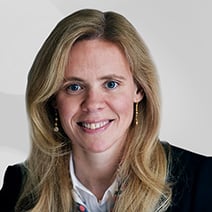Active portfolio management powered by continuous cash flow analysis
The Cashflow Solution investment process is designed to capture the best in both flexibility and discipline. It is dynamic enough to adapt to changing market conditions, yet investment decisions are firmly process-based to minimise emotional and behavioural biases.
A key advantage of this approach is that it helps us time our exits and entries to positions.
Earlier in the year, we discussed how to avoid the common behavioural trap of holding onto winners for too long, using the example sales of two long-term quality growth stalwarts – ASML and Novo Nordisk – from our European portfolios.
By applying the same investment process to a dynamic data set – valuation, price and market regime data which changes continuously, and company cash flow which often updates quarterly – we have now been able to reinstate ASML within portfolios as a high-conviction European holding.
ASML had seen modest cash flow deterioration
While ASML and Novo Nordisk stocks had been good long-term contributors to portfolio performance, the decision to divest was driven by our ongoing analysis of cash flow trends among the European company universe. We sold the position in ASML in August 2024 and started to exit the position in Novo Nordisk in late 2024.
Both retained enough cash flow appeal to rank in the top 20% of the market across our two core cash flow ratios – our Cashflow Champions Watchlist – but they were no longer among the best 30 to 50 ideas which we would wish to include in a portfolio.
Dutch lithography specialist ASML has seen booming demand for its technology as the semiconductor industry has ramped up production during the AI investment boom.
While historically ASML generated a lot of cash from its asset base, enjoyed strong business momentum, self-funded its own growth and returned lots of cash to shareholders, we noticed some gradual deterioration in its cash flow scores earlier this year.
In order to meet customer demand, ASML increased capital expenditure significantly, while its working capital components had deteriorated. In terms of the secondary scores we use to categorise companies’ cash flow profiles, this had contributed to falling ratings on Momentum, Cash Return and Recovering Value.
Because its stock valuation was very full at the same time as its cash flow had deteriorated, there was a clear signal for us to sell the position and replace with a higher scoring member of the Cashflow Champions Watchlist.
This decision proved well timed as the shares went on to underperform the European market over the subsequent 12 months.
Reinstating ASML: A data-driven decision
However, we still liked ASML as a business, which retains a lot of quality growth hallmarks, and still ranked in the top 20% of European stocks we monitor closely for portfolio management opportunities.
A number of developments prompted us to revisit the position at the start of Q4: firstly, its valuation has moderated, naturally boosting its appeal on some of the cash flow ratios we look at - the shares had returned to the top decile of the European market on our core composite cash flow ranking. And secondly, from a secondary scores perspective, we noted an improvement – in particular in the stock’s Recovering Value and Momentum scores.
While ASML has been able to re-enter the top tier of our cashflow picks, Novo Nordisk will remain on the sidelines for now. We sold the stock on signs of cash flow and working capital deterioration associated with its investment in scaling production of its weight-loss drugs. Since then, investors have been disappointed in Novo’s sales growth within the weight-loss market, while a boardroom overhaul has further clouded the investment outlook.
Lower investor anxiety points to more supportive environment for quality growth stocks
From a portfolio management perspective, adding ASML back has allowed us to increase the quality growth tilt in portfolios.
We aim for our portfolios to provide core European market exposure, with the flexibility to perform well in different market environments. This flexibility is driven by our proprietary market regime indicators, which guide us on which investment styles and secondary cash flow scores to emphasise given the prevailing market conditions.
Our market regime indicators for Europe currently suggest a positive market trend with valuations continuing to be reasonable and levels of corporate malinvestment remaining low. Our investor anxiety indicator continues to fall, suggesting a balanced portfolio by style, albeit with an emphasis on momentum.
KEY RISKS
Past performance does not predict future returns. You may get back less than you originally invested.
We recommend this fund is held long term (minimum period of 5 years). We recommend that you hold this fund as part of a diversified portfolio of investments.
The Funds managed by the Cashflow Solution team:
- May hold overseas investments that may carry a higher currency risk. They are valued by reference to their local currency which may move up or down when compared to the currency of a Fund.
- May have a concentrated portfolio, i.e. hold a limited number of investments (35 or fewer) or have significant sector or factor exposures. If one of these investments or sectors / factors fall in value this can have a greater impact on the Fund's value than if it held a larger number of investments across a more diversified portfolio.
- May, under certain circumstances, invest in derivatives, but it is not intended that their use will materially affect volatility. Derivatives are used to protect against currencies, credit and interest rate moves or for investment purposes. There is a risk that losses could be made on derivative positions or that the counterparties could fail to complete on transactions. The use of derivatives may create leverage or gearing resulting in potentially greater volatility or fluctuations in the net asset value of the Fund. A relatively small movement in the value of a derivative's underlying investment may have a larger impact, positive or negative, on the value of a fund than if the underlying investment was held instead. The use of derivative contracts may help us to control Fund volatility in both up and down markets by hedging against the general market.
- The use of derivative instruments that may result in higher cash levels. Cash may be deposited with several credit counterparties (e.g. international banks) or in short-dated bonds. A credit risk arises should one or more of these counterparties be unable to return the deposited cash.
- May encounter liquidity constraints from time to time. The spread between the price you buy and sell shares will reflect the less liquid nature of the underlying holdings.
- Outside of normal conditions, may hold higher levels of cash which may be deposited with several credit counterparties (e.g. International banks). A credit risk arises should one or more of these counterparties be unable to return the deposited cash.
- May target an absolute return. There is no guarantee that an absolute return will be generated over the time period stated in the fund objective or any other time period.
The risks detailed above are reflective of the full range of Funds managed by the Cashflow Solution team and not all of the risks listed are applicable to each individual Fund. For the risks associated with an individual Fund, please refer to its Key Investor Information Document (KIID)/PRIIP KID.
The issue of units/shares in Liontrust Funds may be subject to an initial charge, which will have an impact on the realisable value of the investment, particularly in the short term. Investments should always be considered as long term.
DISCLAIMER
This material is issued by Liontrust Investment Partners LLP (2 Savoy Court, London WC2R 0EZ), authorised and regulated in the UK by the Financial Conduct Authority (FRN 518552) to undertake regulated investment business.
It should not be construed as advice for investment in any product or security mentioned, an offer to buy or sell units/shares of Funds mentioned, or a solicitation to purchase securities in any company or investment product. Examples of stocks are provided for general information only to demonstrate our investment philosophy. The investment being promoted is for units in a fund, not directly in the underlying assets.
This information and analysis is believed to be accurate at the time of publication, but is subject to change without notice. Whilst care has been taken in compiling the content, no representation or warranty is given, whether express or implied, by Liontrust as to its accuracy or completeness, including for external sources (which may have been used) which have not been verified.
This is a marketing communication. Before making an investment, you should read the relevant Prospectus and the Key Investor Information Document (KIID) and/or PRIIP/KID, which provide full product details including investment charges and risks. These documents can be obtained, free of charge, from www.liontrust.com or direct from Liontrust. If you are not a professional investor please consult a regulated financial adviser regarding the suitability of such an investment for you and your personal circumstances.

Samantha Gleave
Samantha Gleave joined Liontrust in 2012 and since then has managed the Cashflow Solution range of funds with James Inglis-Jones. She began her career at Sutherlands Ltd as a Consumer Analyst before moving on to Fleming Investment Management as senior Investment Analyst covering Pan Europe, where she worked with James Inglis-Jones.

James Inglis-Jones
James Inglis-Jones joined Liontrust in March 2006 to develop the Cashflow Solution investment process. He co-manages the Cashflow Solution range of funds with Samantha Gleave. James began his career at Fleming Investment Management in 1997, assuming responsibility for the management of UK equity portfolios in 1999.


